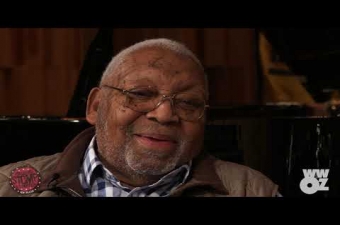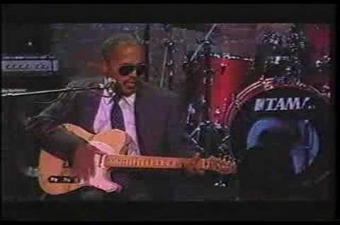Hayes’ Chicken Shack/Vernon’s
2101 Louisiana AvenueNew Orleans LA 70115
The name “Hayes’ Chicken Shack” undersold Henry and Ethel Hayes’ restaurant in the early 40s, and became an egregious misnomer in 1946, when, according to the Louisiana Weekly, the outfit moved to a large “swanky and modern” brick building on the opposite side of Louisiana Avenue. After that it was billed as “New Orleans’ finest colored restaurant,” where patrons dressed to the nines dined on linen-covered tables and enjoyed the popular bands of the day, like the Clyde Kerr Orchestra.
In the spring of 1949, Hayes’ began holding weekly talent shows, which, as Bala James Baptiste writes in Race and Radio, became “hugely popular.” They were recorded for broadcast as the “Negro Talent Hour” on radio station WNOE by O.C.W. Taylor, the first Black radio announcer in New Orleans and principal of McDonogh No. 35. (Another pioneer in Black broadcasting, “Tex” Stephens, broadcasted a radio show on WJBW from the Chicken Shack as well.)
The talent that summer included 15-year-old Huey Smith, a piano phenom battling stage fright. Biographer John Wirt recounts Smith spotting Imperial Records artist, producer, and A&R man Dave Bartholomew at the bar, and nervously playing the riff from his recent hit record “Country Boy.” The gesture didn’t win over Bartholomew—that came later in the 50s, when Smith wrote and played on R&B hits like “Don’t You Just Know It”—but the reading on an applause meter helped the young pianist earn second place.
One night in July the $200 first place prize went to another prodigy, a 12-year-old blind guitarist named Fird Eaglin, later known as Snooks Eaglin. He and Smith both went on to record with Bartholomew for Imperial in the early 60s, but Eaglin never climbed the charts. He did, however, become a beloved live act later in his career, finger-picking his guitar behind his head and covering material from “Jesus Will Fix It For You” to “Back That Azz Up.”
For Henry and Ethel Hayes, owners of the Chicken Shack, promoting young Black talent was part of a larger project of racial uplift. Their restaurant also hosted civil rights organizations, Black social clubs, political rallies, and an array of fundraisers.
In keeping with its air of sophistication, Hayes’ emerged as a venue for modern jazz in the mid- to late-50s. The American Jazz Quintet brought the vanguard of the local scene to the venue. They were youngsters scrapping for gigs at the time, though today the line-up reads like a Hall of Fame roster: Harold Battiste, saxophone; Alvin Batiste, clarinet; Ellis Marsalis, paino; Ed Blackwell, drums; and Richard Payne and others on bass.
From Hayes’ to Vernon’s
In 1959 Henry Hayes leased the club to a new operator, “Vernon” Williams, who became its new namesake. He’d been running a steakhouse near the Dew Drop Inn on LaSalle Street, where he presented readings by the beat poet Eluard Burt with musical accompaniment. Those performances shifted to Vernon’s nightclub, with aces “Chuck” Badie and “Smokey” Johnson on bass and drums in 1960.
Dr. John recalled Vernon’s to author Michael Oliver-Goodwin as “the jazz showcase room in New Orleans. It was on Louisiana Avenue, right near the projects…It was really near to the heart and soul and balls of New Orleans music.” It attracted heavy hitters from across the country, like Ramsey Lewis and Cannonball Adderly.
One of the more memorable showcases at Vernon’s spanned two weeks in October 1962, when John Coltrane performed with his band including drummer Elvin Jones and pianist McCoy Tyner. Earl Turbinton, a prime mover for modern jazz in New Orleans, told author Jason Berry, “This was like God was in town. The whole music community turned out.”
Writer and musician Charles Suhor, who experienced the shows, noted that “the impact of Coltrane’s visit was powerful and highly salutary” for local artists. He went on:
Turbinton visited with Trane for several days and was tutored in the saxophonist’s daring new approaches…. In Marsalis’ group, drummer [James] Black, previously influenced most strongly by Ed Blackwell, began working with Jones’s thundering asymmetries. Marsalis expanded his range along the lines of Tyner. [“Nat”] Perrilliat…had the imagination and technique to emulate Coltrane’s cascading ‘sheets of sound.’
In 1963 Henry Hayes took Vernon Williams to court for violating his lease, and a judge ruled in favor of Hayes, then a vice president of the local branch of the NAACP. An attempt to rebrand the nightspot a third time was short-lived, and a few years later the building was levelled to make way for a residence hall for nurses at nearby Flint-Goodrige Hospital (birthplace of countless Black artists during segregation).
For more on the roots of rock ‘n’ roll in New Orleans click here.
Videos

Ellis Marsalis reflects on his career with Jessie McBride in 2019. At 1:07:15 he recalls playing at Vernon's with the American Jazz Quintet.
Video for A Closer Walk by the Ponderosa Stomp Foundation and WWOZ.
Ellis Marsalis reflects on his career with Jessie McBride in 2019. At 1:07:15 he recalls playing at Vernon's with the American Jazz Quintet.

Snooks Eaglin, who wowed the audience at Hayes' Chicken Shack at 12 years old, performs "Lipstick Traces" with George Porter, Jr., a frequent collaborator later in his career.
Video posted by musicbarn.
Snooks Eaglin, who wowed the audience at Hayes' Chicken Shack at 12 years old, performs "Lipstick Traces" with George Porter, Jr., a frequent collaborator later in his career.
Images









